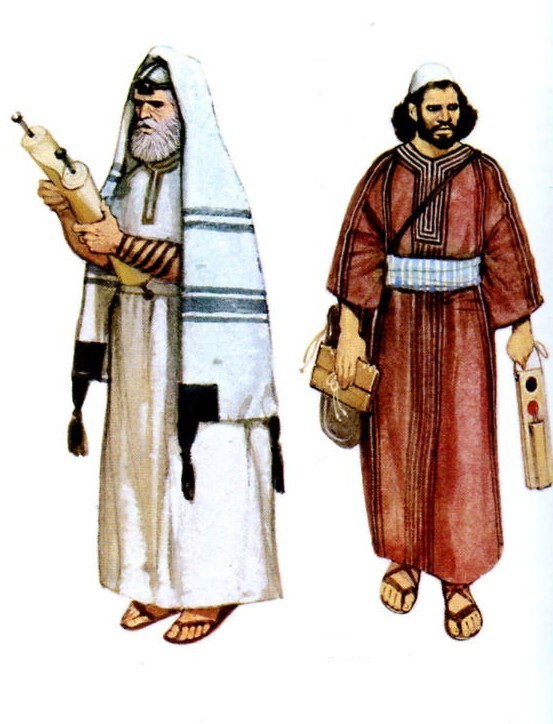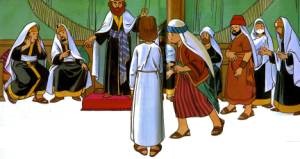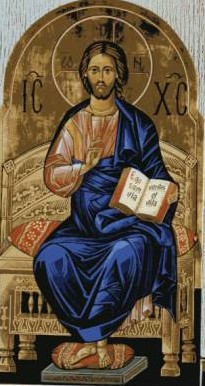Thirty-first Sunday in Ordinary Time - Cycle A
(text
only, to print)
 Jesus Recriminates Some
Defects of scribes and Pharisees
Jesus Recriminates Some
Defects of scribes and Pharisees
Upon finishing reading this gospel we may have this reaction: it was already time for Jesus to correct the conduct of scribes and Pharisees, who were his enemies! But I believe that Jesus, rather than to correct their conduct, wanted to indicate the defects of the leaders of the People of Israel and, of everyone in general, so that, those of us who have the mission to lead Christians, would not have those defects, nor would any Christian. Jesus is a great pedagogue and knew that human beings always fall into the same defects.
Who Were the sCribes and the Pharisees?
Scribes were Jews who had studied the Bible and were experts in the Law of Moses. After some years of study they were recognized as being the true interpreters of the Law.
Pharisees were people whom sought to maintain the fervor and the
fidelity to the law.
The Pharisees were not bad people. They were pious, observant of the Law of God, and sought to please Him. But they were so observant of the Law that they became legalists. They made an absolute of outer forms and rites, carried out meticulously to the minimum detail. This led them to leave aside more important things, like the charity and mercy.
Jesus does not question their authority to teach, nor their legitimacy; he does not call to disobedience. He only warns that their conduct is not to be imitated: Do and observe all things whatsoever they tell you, but do not follow their example. For they preach but they do not practice. (Mt 23:3).
Jesus Indicates Some Defects
Jesus emphasizes their incoherence. What they say is not false, but their works deny their words.
The words are beautiful in the mouth of him who puts them into practice!
To speak is easy, to act is more difficult. We speak much but we do little.
Another defect that Jesus indicates is the double measure they had to judge the conduct of others. They tie up heavy burdens hard to carry and lay them on people's shoulders, but they will not lift a finger to move them (Mt 23.4). We also easily accuse our brother of his or her faults and we do not see the beam that we have in our eye. Jesus said: Why do you notice the splinter in your brother's eye, but do not perceive the wooden beam in your own eye? (Mt 7:3).
Once one lady came to confession, I listened to her and when she finished I said: now, don’t confess the sins of others, but your sins.
 Another defect that Jesus indicates is the vanity they had; which we
also have: They widen their phylacteries
and lengthen their tassels. They love places of honor at banquets, seats of
honor in synagogues (Mt 23,5-6).
Another defect that Jesus indicates is the vanity they had; which we
also have: They widen their phylacteries
and lengthen their tassels. They love places of honor at banquets, seats of
honor in synagogues (Mt 23,5-6).
Phylacteries were square cases, normally made out of leader, which contained parchment strips, which recalled the Law of Moses, and they carried them on the head and on the left hand.
We like for people to see our good works and to praise us. Jesus said: But when you pray, go to your inner room, close the door, and pray to your Father in secret. And your Father who sees in secret will repay you (Mt 6:6).
We could indicate other defects, but we don’t have more time. Lets now indicate what Jesus calls us to do.
 With respect to the word rabbi,
which means "teacher", I will tell you a very peculiar anecdote. One
day, I was having supper with a very Catholic family, when someone rung the
door bell; it was the Jehovah’s Witnesses. I was asked to help with these
words: "Father, come please". When I get there, they read to me these
words of today’s gospel: Call no one on
earth your father; you have but one Father in heaven (Mt 23:9). I explained to them that the
words of the Bible are not always to be read literally, but we must consider
the sense and the circumstances in which they were said. I could not convince
them! To finish, I asked them if they never called their father, “father”. They
did not say anything and they went away quite annoyed.
With respect to the word rabbi,
which means "teacher", I will tell you a very peculiar anecdote. One
day, I was having supper with a very Catholic family, when someone rung the
door bell; it was the Jehovah’s Witnesses. I was asked to help with these
words: "Father, come please". When I get there, they read to me these
words of today’s gospel: Call no one on
earth your father; you have but one Father in heaven (Mt 23:9). I explained to them that the
words of the Bible are not always to be read literally, but we must consider
the sense and the circumstances in which they were said. I could not convince
them! To finish, I asked them if they never called their father, “father”. They
did not say anything and they went away quite annoyed.
Jesus asks us to recognize that we are brothers, and that He is the only teacher whom we must follow. That all, but specially those in charge of the community, have to serve. We all have to be servants of the community. The greatest among you must be your servant (Mt 23.11).
Finally, Jesus
tells us that humility has to be the norm of our conduct. Whoever exalts himself will be humbled; but whoever humbles himself
will be exalted (Mt
Two Great Examples of Humility
Jesus said: "I am meek and
humble of heart "(Mt
Mary said: "For he has looked upon
his handmaid's lowliness; behold, from now on will all ages call me
blessed" (Lk
Nothing else, for today.
Have a good Sunday and a good week.